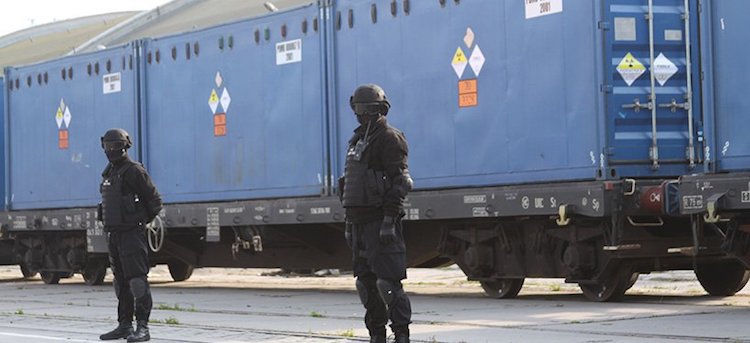By J C Suresh

TORONTO (IDN) – A new report reveals an alarming diminution of U.S. congressional engagement and interest in critical efforts to prevent nuclear terrorism and proposed “action items” for lawmakers in enhancing nuclear security efforts and reducing global stockpiles of nuclear materials.
Titled Empowering Congress on Nuclear Security: Blueprints for a New Generation, the report from Partnership for a Secure America and the Arms Control Association also assesses current congressional staff attitudes about nuclear security and explores the role of Congress and case studies in congressional leadership on this issue.
“As the threat of nuclear terrorism continues to loom, America must maintain its leadership of global efforts to keep dangerous nuclear and radiological materials out of the wrong hands,” said Nathan Sermonis, Executive Director of Partnership for a Secure America. “Unfortunately, congressional interest has steeply declined with nuclear security faded from the headlines. We need, however, an all-of-government approach to advance the most effective measures against this threat.”
According to the Washington-based Arms Control Association press release, this joint report, made possible by funding provided by the John D. and Catherine T. MacArthur Foundation, “comes at a time when national attention on the security of nuclear and radioactive materials is declining even as these materials remain at risk from theft and more countries express interest in nuclear research and development.”
“Despite significant progress in securing and eliminating nuclear materials around the world and the continued dedicated leadership role of several lawmakers, there is a need for Congress to play a more active role in shaping nuclear security policy,” noted Kingston Reif, Director for Disarmament and Threat Reduction Policy at the Arms Control Association.
“We provide an important blueprint to build upon Congress’ historic bipartisan achievements on nuclear security and engage a new generation of policy advisers on Capitol Hill,” he added.
The global nuclear security enterprise is at a critical crossroads. While the worldwide use of nuclear and radioactive materials has grown, the issue of nuclear security, broadly defined by the International Atomic Energy Agency (IAEA) as “security of nuclear materials and the facilities that house them,” has all but faded from the U.S. national conversation. As these materials become more widespread, they will be vulnerable to criminal and terrorist organizations without sufficient security efforts.
Despite this risk nuclear security is not a high priority on Capitol Hill, and leadership is largely ceded to the executive branch where competing interests increasingly sideline this critical issue, says the report. The history of bipartisan congressional engagement on nuclear security dramatically contrasts with today’s level of legislative interest. Attention has sharply declined since the end of the Nuclear Security Summit process in 2016 and the exodus of congressional members and staff who formed their worldviews through the Cold War.
To better understand past and present congressional engagement on nuclear security, Partnership for a Secure America (PSA) and the Arms Control Association (ACA) jointly undertook a first-ever study of current congressional staff attitudes on the issue and explored case studies of congressional leadership in this field.
This report is divided into five sections. The first section assesses the current nuclear security threat environment and summarizes the Trump administration’s actions on nuclear security to date. The second section outlines the role of Congress on nuclear security. The third section analyzes three examples of past and current congressional leadership on nuclear security. The fourth section presents the results of the joint study of congressional attitudes, providing ten effective strategies for engaging Congress on nuclear security. And the fifth section provides ten recommendations on action items for Congress.
The Nuclear Security Summit process and U.S. nuclear security and threat reduction programs have played a vital role in reducing the risk of nuclear terrorism, the study notes. However, significant gaps remain, particularly with respect to the security of highly enriched uranium (HEU) and plutonium stockpiles. About 50 new nuclear power plants are under construction around the world and 20 countries that do not currently have nuclear power programs have expressed interest in developing them. The use of emerging technologies with potential nuclear proliferation and nuclear security implications poses new challenges.
The report warns that the task of plugging the gaps and reducing material stockpiles is likely to be more challenging now that the summit process, the last gathering of which took place in March 2016, and the high-level political attention it brought to this issue has come to an end. In addition, Russia, which possesses the largest cache of nuclear weapons usable material on the planet, boycotted the 2016 Summit and ended most nuclear security cooperation with the United States in 2014. Cooperation with other countries that pose significant nuclear security risks remains limited.
Meanwhile, U.S. budgets for nuclear security continue to decline while funding to sustain and upgrade U.S. nuclear weapons trends upward. In addition, Congress has restricted nuclear security cooperation with Russia and taken initial steps to constrain cooperation with China. The Trump administration’s limited interest in nuclear security has also introduced uncertainty about sustaining U.S. leadership on the issue. [IDN-InDepthNews – 26 July 2018]
Photo: Highly enriched uranium awaiting secure transportation by rail on September 26, 2010. Credit: National Nuclear Security Administration
IDN is flagship agency of the International Press Syndicate.
facebook.com/IDN.GoingDeeper – twitter.com/nukeabolition






